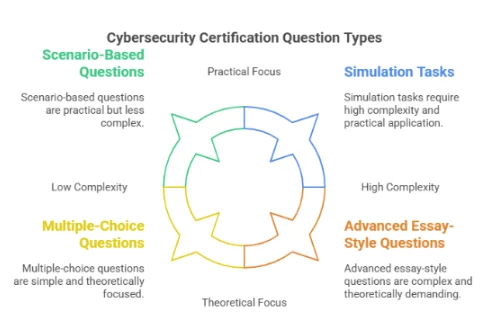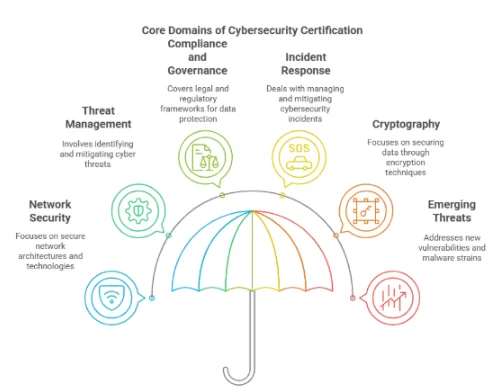Table of Contents
- Why Cybersecurity Certification Exam Questions Matter
- Types of Cybersecurity Certification Exam Questions
- How to Prepare for Cybersecurity Certification Exam Questions
- Common Topics to Expect in Cybersecurity Certification Exam Questions
- ACSMI Certification Breakdown
- FAQ
- 1.What resources should I use to prepare for cybersecurity certification exams?
- 2.How hard are cybersecurity certification exams?
- 3.How many hours should I study for cybersecurity certification exams?
- 4.Are cybersecurity certification exam questions standardized?
- 5.Can I pass cybersecurity certifications without an IT background?
- 6.How long should I prepare for certification exams?
- Final Thoughts
The cybersecurity industry is experiencing exponential growth, with organizations across various sectors actively seeking skilled professionals to protect their digital infrastructures. Security Technology Key Trends continue to shape how professionals prepare and adapt to evolving threats. Certifications such as CEH, CISSP, and ACSMI have become the gold standard for demonstrating expertise and advancing careers in this dynamic field. However, passing these certifications is not an easy feat—it demands rigorous preparation and a profound understanding of cybersecurity exam questions. This blog will delve deep into understanding why cybersecurity certification exam questions matter, the types of questions you will encounter, preparation strategies, and the common topics covered in cybersecurity exams.
Why Cybersecurity Certification Exam Questions Matter
Cybersecurity certification exam questions are much more than just a means of assessment—they are the ultimate test of both your theoretical knowledge and practical problem-solving abilities. These questions challenge you to apply what you’ve learned in real-world scenarios, such as identifying network vulnerabilities, responding to data breaches, or implementing risk mitigation strategies. The purpose of these questions is to ensure that you are not just memorizing concepts but can actively contribute to solving complex cybersecurity problems.
These questions mirror the types of challenges cybersecurity professionals face on the job. For instance, when preparing for certifications like CompTIA Security+, candidates may encounter simulation tasks that mirror the real-life process of troubleshooting network security issues. Similarly, advanced certifications such as CISSP require you to demonstrate strategic thinking and problem-solving in highly detailed scenarios. This ensures that cybersecurity professionals can act decisively and effectively under pressure, making them valuable assets to any organization.
Ultimately, cybersecurity certification exam questions are designed to evaluate not just theoretical knowledge but also your ability to think critically and apply your expertise. Whether you’re pursuing an entry-level certification like CompTIA Security+ or a more advanced certification like CISSP, mastering these exam questions will ensure that you are well-prepared for the challenges of today’s cyber threat landscape.
Types of Cybersecurity Certification Exam Questions
A significant aspect of preparing for cybersecurity certifications is understanding the different types of questions you will encounter. Each certification has a unique focus, but the following categories of questions are commonly represented across most programs:

Multiple-Choice Questions (MCQs)
Multiple-choice questions are designed to test your theoretical understanding of cybersecurity concepts. These questions require you to select the correct answer from a set of options. The goal of MCQs is to assess your knowledge of fundamental principles, terminology, and concepts.
Example Question: “Which of the following is considered a vulnerability in network security?”
The key to excelling in MCQs is understanding the core concepts thoroughly and eliminating answers that are clearly incorrect. While they may seem straightforward, some multiple-choice questions can be tricky, requiring you to pay close attention to subtle details.
Scenario-Based Questions
Scenario-based questions test your ability to apply cybersecurity concepts in practical, real-world situations. These questions often present a situation involving a cybersecurity incident and ask you to choose the best course of action based on your knowledge and experience.
Example Question: “You discover unusual traffic on a company’s network. What steps should you take to investigate and mitigate the issue?”
For these questions, it’s essential to have a structured approach to problem-solving. Scenario-based questions are designed to assess your ability to make informed decisions under pressure, as you would need to in a real-life security incident.
Simulation Tasks
Simulation tasks are among the most practical types of cybersecurity certification questions. They mimic real-world environments where you are required to perform specific tasks, such as running penetration tests, conducting risk assessments, or implementing network security measures.
Example Question: “Perform a security scan on a given network and identify potential threats.”
Simulation tasks assess your ability to apply your skills in a hands-on environment. These tasks require familiarity with cybersecurity tools and software and will test your problem-solving abilities as you work through complex scenarios.
True/False and Drag-and-Drop Questions
True/False and drag-and-drop questions are often used in entry-level certifications like Security+. True/false questions assess your understanding of basic facts, while drag-and-drop questions may require you to organize or match items correctly, such as grouping types of security measures or correctly identifying the components of a network.
These question types are generally less complex than scenario-based or simulation questions but still play an essential role in testing your foundational knowledge.
Advanced Essay-Style Questions
For advanced certifications such as CISSP, essay-style questions may be included to assess your ability to think critically and provide in-depth strategic analysis. These questions typically require you to write a well-thought-out response to a scenario, demonstrating your ability to think critically, make decisions, and present a clear rationale. Such formats are often found in Top Information Technology Security Certifications to ensure candidates can apply concepts effectively in real-world situations.
Example Question: “How would you implement a risk management strategy for a healthcare organization that needs to meet HIPAA compliance?”
Essay-style questions test your strategic thinking, knowledge of industry best practices, and ability to articulate complex ideas effectively.
How to Prepare for Cybersecurity Certification Exam Questions
A systematic approach to preparing for your cybersecurity certification exam is essential for success. The following steps will guide you through the preparation process, ensuring you are fully equipped to tackle exam questions confidently.

1. Understand the Exam Blueprint
Each certification outlines its core domains and topics. Familiarizing yourself with the exam blueprint is crucial, as it will help you identify the key areas of focus and prioritize your studies. The blueprint serves as a roadmap, guiding your preparation efforts and helping you focus on the topics most likely to appear on the exam.
2. Practice with Mock Tests
Mock exams are one of the most effective ways to prepare for certification exams. Many organizations offer practice exams that mimic the real exam environment, giving you a feel for the types of questions you’ll encounter. By taking multiple practice tests, you can familiarize yourself with the question formats and improve your time management skills.
3. Study with Reliable Resources
Using trusted resources, such as vendor-recommended study materials, textbooks, and online courses, is essential for thorough preparation. Resources like the ACSMI program offer over 400 in-depth modules, covering all core cybersecurity concepts. These materials are designed to provide a structured and comprehensive study experience, allowing you to build a solid foundation in cybersecurity.
4. Join Study Groups
Collaborating with peers can enhance your preparation efforts. Study groups allow you to exchange insights, discuss difficult concepts, and share resources. Engaging with others who are also preparing for certification exams can provide additional perspectives and help reinforce your understanding of complex topics.
5. Focus on Time Management
Most cybersecurity certification exams are time-constrained, meaning that you need to manage your time effectively to answer all questions within the allotted period. Practicing with timed mock tests will help you develop strategies for managing your time during the real exam, ensuring that you don’t rush through questions or miss critical details.
6. Hands-On Practice
Cybersecurity exams often require practical skills, especially in advanced certifications. Hands-on practice using penetration testing software, risk analysis tools, and other cybersecurity resources will allow you to build the skills necessary to succeed in simulation tasks. The ACSMI program provides hands-on training, ensuring that you’re well-prepared for the practical components of the exam.
Common Topics to Expect in Cybersecurity Certification Exam Questions
While each certification has its focus, most cybersecurity certification exams cover some overlapping core areas. Here are the key domains that are commonly assessed in certifications like CEH, CISSP, and ACSMI:

1. Network Security
Network security is a crucial area of focus for any cybersecurity certification. You’ll need to demonstrate your understanding of firewalls, intrusion detection systems (IDS), and virtual private networks (VPNs), as well as your ability to design and implement secure network architectures.
2. Threat Management
This domain involves identifying, assessing, and mitigating various cyber threats, including malware, phishing, and ransomware attacks. Understanding the threat landscape and how to proactively defend against these threats is vital for passing your certification exam.
3. Compliance and Governance
Cybersecurity professionals must understand the legal and regulatory landscape that governs data privacy and protection. In this domain, you’ll need to demonstrate knowledge of compliance frameworks like GDPR, HIPAA, and PIPEDA, and understand how to implement policies that ensure legal compliance.
4. Incident Response
Knowing how to respond to and manage cybersecurity incidents is another essential area of focus. You’ll need to show that you can develop and execute an incident response plan, containing and mitigating threats while ensuring minimal damage to the organization.
5. Cryptography
Cryptography is the practice of securing communication and data through encryption. You’ll need to demonstrate an understanding of various cryptographic techniques, including hashing, encryption algorithms, and public/private key infrastructure (PKI).
6. Emerging Threats
As the cyber threat landscape evolves, staying up to date on the latest vulnerabilities, malware, and exploits is essential. Security Technology Is Shaping how we respond to these challenges. Cybersecurity certifications often test your knowledge of emerging threats, such as zero-day vulnerabilities and the latest malware strains.
ACSMI Certification Breakdown
The ACSMI certification program stands out as one of the most comprehensive cybersecurity certification programs. With more than 400 modules, ACSMI offers in-depth training on all key domains of cybersecurity, including network security, threat management, and compliance. The program combines theoretical knowledge with hands-on labs, ensuring that candidates are fully equipped to handle both theoretical questions and practical challenges.
ACSMI’s modular approach allows you to learn at your own pace, and the program offers a wide range of resources to help you prepare for your certification exam. Whether you’re a beginner or an experienced cybersecurity professional, ACSMI’s certification program provides the knowledge and skills necessary to excel in today’s competitive cybersecurity job market.
Six Lesser-Known Facts About Cybersecurity Certifications
- ACSMI Offers Modular Learning: ACSMI’s certification program includes over 400 modules designed to provide a comprehensive and flexible learning experience, allowing students to focus on specific areas of interest.
- CISSP Requires Experience: To sit for the CISSP exam, candidates must have at least five years of relevant work experience. However, you can substitute one year of experience by completing an approved cybersecurity education program.
- CompTIA Security+ is Often a Stepping Stone: Many cybersecurity professionals begin their journey with CompTIA Security+, which provides foundational knowledge and is often required for more advanced certifications.
- Cybersecurity Certifications are Stackable: You can combine multiple certifications to increase your expertise. For example, obtaining CompTIA Security+ can complement more advanced certifications like CISSP or CEH.
- Continuous Professional Education (CPE) Credits: Certifications like CISSP require ongoing education to maintain your credentials. You must earn CPE credits regularly to keep your certification active.
- Virtual Simulations for Hands-On Learning: Many cybersecurity programs, including ACSMI, incorporate virtual environments for training, allowing you to simulate real-world cyber-attacks and security defenses.
Final Thoughts
Succeeding in cybersecurity certification exams requires a blend of theoretical knowledge, hands-on experience, and a structured study approach. By understanding the types of questions you’ll face and utilizing resources like ACSMI’s comprehensive program, you’ll be well-equipped to tackle any exam. With a solid understanding of cybersecurity principles and the right preparation, you can confidently pursue your cybersecurity certification and take the next step in advancing your career.
FAQs
What resources should I use to prepare for cybersecurity certification exams?
Official study guides, textbooks, practice exams, and online courses like ACSMI’s 400+ modules are recommended for thorough preparation.
How difficult are cybersecurity certification exams?
The difficulty varies by certification level. Entry-level exams like CompTIA Security+ are relatively straightforward, while advanced exams like CISSP require extensive preparation and hands-on experience.
How many hours should I study for cybersecurity certification exams?
For entry-level exams, 100-150 hours of study is typical. For advanced certifications, preparation may require upwards of 300 hours, depending on your experience.
Are cybersecurity certification exam questions standardized?
Yes, most cybersecurity certification exams use standardized questions to assess your core competencies. However, scenario-based or simulation tasks may vary.
Can I pass cybersecurity certifications without an IT background?
Yes, certifications like CompTIA Security+ and ACSMI’s beginner modules are designed for those with little to no IT experience and provide foundational knowledge.

Leave a Reply